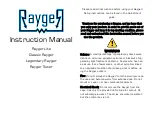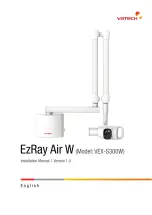
PACE 203H – Instructions for Use
5I-17-016X-B-20
91 / 139
Example:
AVD
adapted
In this example, PACE 203H changed
the A-V Delay.
Note
: Because of this maneuver, PACE
203H does not switch to an automatic
mode. PACE 203H simply determines
and sets one or more parameters, simi-
lar to what the corresponding automatic
mode would have determined.
9.22.8 Effects from Therapeutic and
Diagnostic Energy Sources
9.22.8.1 Defibrillation
PACE 203H is designed in such a man-
ner that it withstands defibrillation dis-
charges according to ISO 14708-1.
Warning:
Any protection against defibril-
lation discharges is limited, due to the
low resistance required by the pacemak-
er output circuitry. In any case, it is man-
datory to monitor the patient for a period
of time after defibrillation, and to be pre-
pared for a possible failure or malfunc-
tioning of the pacemaker.
To protect the patient and the pacemak-
er from current passing through the
pacemaker / lead-circuit, caused by de-
fibrillation discharges, the stimulation
circuit should always be opened, if pos-
sible.
Excessively high currents can also dam-
age the pacemaker.
9.22.8.2 RF Surgery
When using RF electrocautery and RF
surgery instruments, very strong electri-
cal and magnetic interference is gener-
ated which can influence, or even dam-
age electronic instruments like PACE
203H. Fibrillation currents can also be
generated by crosstalk into the leads
and cables.
If simultaneous use of PACE 203H and
electro-surgical instruments is required,
PACE 203H should be set to an asyn-
chronous pacing mode (without any
sensing).
Warning:
In any case, it is mandatory to
continuously monitor the patient, and to
be prepared for a possible failure or mal-
functioning of PACE 203H.
9.22.9 Summary of Text Messages
PACE 203H differentiates between con-
flicts, application related and device
related errors, and warning messages.
These are documented in the following
sub-sections.
9.22.9.1 Warning Messages Related
to Conflicting Parameter
Settings
Conflict warnings alert the user that he
or she must adjust unusual, conflicting
parameter settings. Such settings can
result in improper pacing therapy for the
patient. PACE 203H blocks conflicting
parameter settings as long as the
"Alarms" functions are not disabled (see
chapter 9.22.7 and 9.12.5.2).
When PACE 203H determines a conflict,
it displays a warning message in the
Summary of Contents for PACE 203H
Page 2: ......
Page 8: ......
Page 16: ......
Page 20: ......
Page 102: ......
Page 106: ......
Page 108: ......
Page 116: ......
Page 118: ......
Page 124: ...PACE 203H Instructions for Use 124 139 5I 17 016X B 20 Figure 18 Map of Menu Tree Part 2 ...
Page 130: ......
Page 132: ......
Page 136: ......
Page 138: ......
















































